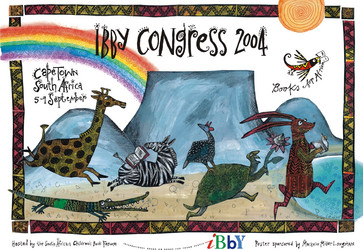Congress 2004
The 29th IBBY Congress 2004 in Cape Town, South Africa
For five eventful days in September 2004, Cape Town in South Africa was the centre of the IBBY world. Over 600 participants from 68 different countries gathered at the Baxter Theatre in the beautiful city that lies at the foot of Table Mountain to address the theme ‘Books for Africa’. The lectures, seminars, exhibitions and informal discussions focussed on the challenges of children’s book publishing in Africa. The varied programme encouraged fruitful discussions about and sought responses to the difficulties of providing books to children everywhere in the world.
Opening Ceremony
The Opening Ceremony took place at the Artscape Opera House in Cape Town. The evening began with a cocktail party hosted by the Mayor of Cape Town, Alderman Nomaindia Mfeketo, in the foyer of the Opera House. When the participants settled in the auditorium Anna Louw, Chair of the South African Children’s Book Forum, greeted the guests: government officials, participants, speakers, sponsors, media people and the many volunteers who had come to join in IBBY’s first congress on the African continent. She set the celebratory tone for the Congress even as she reminded the participants of the urgent challenges that the people of Africa are confronted with.
IBBY’s President, Peter Schneck, announced in his address that IBBY’s presence in Cape Town “acknowledges [its] commitment to support the work of the South African Children’s Book Forum, as well as that of other African National Sections, as they continue to promote children’s literature, even as they deal with the dramatic economic circumstances that this continent faces. We are grateful to have the opportunity to visit a country that has given the world an example of peaceful change as it transforms itself into a society based on the principle of racial equality. We must thank all those who have worked so hard to plan such a rich programme and who have succeeded in bringing so many of us together to discuss how IBBY’s mission statement can be the source of other changes in Africa and, in particular, how it can contribute to a better world for the African children.”
Alderman Nomaindia Mfeketo welcomed IBBY to the city and reminded the participants of the historical context in which they were joining her fellow citizens: South Africa was celebrating ten years of democracy and the end of apartheid. She outlined the many achievements of the post-apartheid period but reminded the audience of the many difficulties still at hand. The need to bring books to children, to educate and to prepare them to participate in their changing world was a major focus of the work of all those building the new South African society and she applauded the efforts of the South African Children’s Book Forum in this regard.
Deputy Minister of Education, Enver Surty, expressed his pleasure and pride in welcoming the IBBY Congress to South Africa where the book still does not have a place in the lives of most of its children. He applauded IBBY’s mission and purpose in Africa and encouraged a deeper involvement in the future.
The highlight of the opening ceremony was the presentation of the Hans Christian Andersen Awards 2004. In her introductory comments, IBBY’s Executive Director, Kimete Basha, thanked the Hans Christian Andersen Jury, whose only honour and recognition for their generous efforts was “knowing that theirs was a job well done: they [had] gratified the work of the National Sections who, at great expense and effort, made their nominations, and they [had] safeguarded the value of the Hans Christian Andersen Award as a platform for IBBY’s critical work to promote books as bridges of understanding.” She thanked the Nissan Motor Company whom, she said, had continued to remember the child and celebrate the story. In thanking Julio Panama, who represented the Nissan Motor Company, she said that the Japanese company had illustrated “that there are many ways that humankind can invest in the future and they have proven time and time again, that [Nissan] have come to believe the dreamers that are IBBY members who affirm that the child’s imagination is the starting point for everything else.”
Jury President, Jeffrey Garrett, gave the laudatio and told the audience that, “this year’s winners of the Hans Christian Andersen medals represent pillars on either side of the fairy tale divide. For all that separates them – culturally, linguistically, in their chosen medium of expression – they are joined spiritually by a shared understanding that life and society present challenges to young people, and that to prevail children must stand upon a bedrock of values, of faith in self, at times of scepticism directed at their elders, even while recognizing their own potential and that of their friends and of loved family members, for self-doubt, betrayal, and all other vices. For these temptations reside in everyone.”
“Martin Waddell, [winner of the 2004 Hans Christian Andersen Award for Writing] was born in 1941 into a Northern Irish family with a history of producing notable writers, is the author of over 150 books. Since writing his first book for children in 1969 – it was the ghost story, In a Blue Velvet Dress – he has been moved to write for children by a number of inner forces – one playful, one perhaps obsessive. One is quite simply a joy of writing. Waddell often seems to fly, to be carried on silken wings by his own delight to be able to participate in the ‘fun and adventure and emotion’ of writing. His ‘Napper’ series of soccer books based on his own past as a goalie, the ‘Little Dracula’ books about the family life of a young vampire, and perhaps most of all his ‘Harriet’ books, about a girl who is far more accident-prone that the rest of us – these are books full of play.
Not all of these books are winners, to be sure. His series of ‘Rock River Stories’, about the adventures of Little Obie somewhere in the American West, might be placed in this category. Americanisms – such as ‘I reckon’ – seem to pop up with even greater frequency than in deepest Kansas. Yet when he is good, he is superb. Even the heroes of Waddell’s more light-hearted series referred to earlier – the under-talented goalkeeper, the aspiring vampire, the accident-prone heroine – are all outsiders, odd-balls if you will, and with that I believe we have what characterizes this year’s Hans Christian Andersen medal winner for writing – and I would now like to focus on his serious fiction for teenagers. It is children who are the outsiders, forced by the inexorable process of growing up into a world not of their making, where, if they are not prepared, they will be exploited, manipulated, and then cast off by the adults who are – or at least some them – the ultimate insiders. I do not wish to speculate on what impact the bomb blast had in 1972 that almost took his life and silenced him as a writer for six years. Whatever inner demons demanding exorcism those may be that only writing can dispel, they have given him his heroes – these outsiders who are physically or socially disadvantaged, but who see the world clearly, or passionately, but usually both. His heroes and heroines are of a cloth with Cassandra, with the blind seers of Greek myth and the prophets of the Old Testament.”
“The 2004 winner of the Hans Christian Andersen Medal for Illustration is Max Velthuijs of the Netherlands. Velthuijs appears to us in the garb of a teller of fables, yet unlike Aesop, his themes are not foolishness, vanity, and the meanness of our fellow man and woman, but the nobility of our native emotions, the power of friendship and love, the uniqueness and inestimable value of the individual and his or her differences, and the triumph of life over death. The stories of Kikker, or Frog, and his diverse group of friends are miniature morality plays for our age, demonstrating in framed vignettes – as if on a stage – that life can be hard but is in the end good, that there will be comfort: do not give up, do not lose faith, for you are stronger than you think, and you are not alone.”
“In recognizing Max Velthuijs with this year’s Andersen Award for illustration, the jury has recognized a gifted artist and illustrator, yes, but even more so the creator of total experiences for children, a comforter, a creator of the foundations for later life. Max Velthuijs is one of the two great pillars across the divide separating early from later childhood whom we are honouring today.”
“If we regard Max Velthuijs as a teller of moral tales and fables, contributing to a bedrock of values and strength for younger children, Martin Waddell, in his great novels, is an introducer of complexities and an introducer to complexities, an author of the open ending which awaits the hero’s, but also the reader’s engagement and commitment to be resolved. Yet like Max Velthuijs, Martin Waddell also never loses sight and never allows his readers to lose sight of the fact that there is a foundation of good under it all, even if it is buried under the detritus of evil behaviour and all the confusion that complexity gives rise to.”
In his speech of acceptance Martin Waddell, spoke of personal memory as the source of his stories.
“I live and work in an Irish seaside town called Newcastle, in Co. Down and nearly all of my stories are the result of things experienced within a few hundred yards of my home at the Rock, overlooking the beach. I was brought up on the Rock, with the Irish Sea at my doorstep, and the dark granite Mountains of Mourne sweeping down into my back garden. It’s my place, the where of my life, and my stories.”
“The first strand of my writing for children is the picture book text. It is the area where I feel most challenged, and most at home. It is my belief, born of listening to children, that their fears and needs are what interest them most, and these fears and needs are common to children the world over. The fear of the dark. The fear of losing your mother. All the fears inherent in the playground question, ‘Can I play with you?’ The fears and needs of very small children are very real to them, and for me it has never been option to dismiss these fears and needs with the traditional happy ending, unless that happy ending arises naturally from the story. Even the most trivial of picture book texts should be fresh, funny, moving and honest.”
“As children grow older they become more aware of the hatred that can exist in the world, the frequent lack of love. As a writer, I feel a need to explore those colder worlds, in the stories for teenagers which form the second strand of my work second but not secondary. I value all my books.
Writing for older children who are discovering themselves and their place in the adult world …….what do I believe is important?
It is important to affirm the older child’s sense of his or her personal and national identity but it is equally important that children learn of differences, of other cultures, other peoples, other voices, the unknown.”
“In my books for older children I have tried to show that love always exists somewhere, that there are always people who will respond to a cry for help, however inadequate and inarticulate the response may be, and however high the odds may be stacked against them. The message is about common humanity, the binding together of people that comes from simply living with each other, listening to each other; trying to understand the strange world of the stranger. Whether children accept that model of the world is something they have to make their own minds up about.”
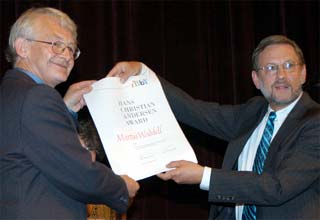
Max Velthuijs, spoke of the enduring battle to “translate one’s fantasy into images.” No award, however gratifying, could make the fight with the empty page easier but it did make his heart lighter. With words that were charged with a remarkable economy and simplicity he reminded the listeners of the magic of his pictures. He gave the audience an idea of how difficult it is to explain his success:
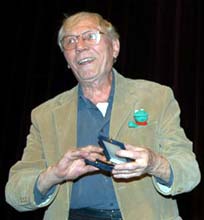
“The jury’s decision to award this prize to me filled me with pride.
But also with amazement, since winning prizes was never my aim.
Does this mean that I am ‘the best’?
Of course not.
There are a lot of talented illustrators who are probably better than I am.
But I regard this honour as a sign of recognition that I am one of them.
And today, I can dwell on the mountaintop, and be somewhat proud.
However, when I think about the road I walked and the struggle I fought to get here, I am also filled with a sense of sadness. Nostalgia wells up in me when I think about the time when Frog was born. How I tried to convey a feeling with only a paintbrush, some paint and a piece of paper.
But is drawing this difficult?
When you happen to be born with a little bit of talent, it’s not so bad.
Drawing a Frog is not so difficult.
But how do you draw a Frog in love? Or a frightened frog?
Are there rules or guidelines to help you?
For this, talent alone is not enough.
Now you need feeling.
The essence of this profession is to share something with the onlooker.”
The evening was interspersed with music from the Pinelands High School Marimba Band; the New Apostolic Church Junior Choir and the St. Louis Steel Band. The Nissan Motor Company sponsored the gala reception during which IBBY Netherlands presented the participants with not only a pocket-sized copy of ‘Frog in Love’, but also a pocket-sized Frog!
Speakers from Around the World to Provide a Synoptic View of Children’s Literature
The following three days offered a rich and extremely innovative programme. Professor Njabulo S. Ndebele, Vice Chancellor of the University of Cape Town, gave the welcoming address before the first plenary speakers opened the professional programme. Professor Osazee Fayose from Ibadan University, Nigeria emphasized the need to create the reading habit in children from a very early age and Teresa Cardenas from Cuba danced and told her own story of survival as she told about Cuban stories that have their cultural roots in Africa. Other speakers and contributors on the first day came from more than twenty countries and explored themes as varied as the place of the oral tradition in developing literacy to examining the representations of Africa in American books for young people.
The second day began with an enlightening historical analysis of the children’s book in South Africa that was presented by Professor Emeritus Elwyn Jenkins of the University of South Africa. Patricia Aldana launched the latest IBBY fundraising project: Under the Spell of the Moon, a beautiful read-aloud art book created for children by great picture book artists from around the world. Participants fell under another spell, this time the ‘universal storytelling moment’ led by Gcina Mhlophe, which was shared by children all over South Africa. Speakers from more than 22 countries were involved in sessions during the day and provided a rare opportunity to examine that challenges that are experienced all over the world by those who try to bring books and story to children who are often living in desperate situations.
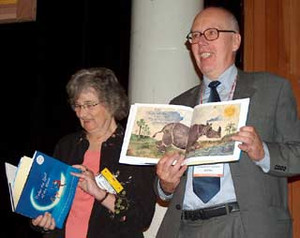
Day three began with a plenary session that brought together Beverly Naidoo, South African author now living in the United Kingdom, Jean Williams, Director of Bibilonef, South Africa, Neville Alexander, Director of PRAESA in Cape Town and Carole Bloch, Co-ordinator of the Early Literacy Unit at PRAESA. (PRAESA is an independent research and development unit attached to the University of Cape Town.) This session focussed on the challenges of providing books in contemporary South Africa. The day’s programme was enriched by speakers from more than 20 nations, which included discussions about the place of the new technologies in developing literacy.
The last day of the Congress provided opportunities for participants to reach out into the Cape Town community through visits to the Centre for the Book where a symposium entitled Humour in the World of Children’s Literature was organized; through visits to local schools and libraries sponsored by Scholastic Publishing and through participation in various tours in and around Cape Town.
The IBBY-Asahi Reading Promotion Award Ceremony
The Italian Club in Rugby provided the festive setting for the presentation of the IBBY-Asahi Reading Promotion Award 2004. However, on the way to the evening celebration participants were treated to a visit to the ZipZap Circus, where young people entertained everyone with their daring acts on the high trapeze, juggling with fire, mono cycle tricks and their general exuberance. After reaching the Italian club, Jury President, Xosé Antonio Neira Cruz, gave the laudatio and together with the representative of the Asahi Shimbun, Atsushi Osaki presented the $US 10,000 cheque and diploma to Lorato Trok who is the project co-ordinator of First Words in Print, the winner of the 2004 IBBY-Asahi Reading Promotion Award. This book development project aims to ensure that all young South Africa children have access to the stimulation of picture books and story books in their own languages.
Xosé Antonio Neira Cruz called IBBY members, “builders of books, tellers of stories, painters of words [whose] world is made of words or images to illustrate words.. With our words, we will try to sow new seeds even as we tend the harvest of the seeds planted by others before us.” He told them that they had “finally come to Africa to talk about dreams and words; we’ve come to celebrate the endless creativity of Africa and to learn more about how books reach African children. We know already that there are many obstacles in the way of the African people who try to make this happen, but we also know that what they can teach us can fill all our houses with unexpected discoveries and intensely stirring dreams.” He praised the winning project for “having filled the South African houses with words and with books. With these gifts has come, as it often does, the hope of a better world for everybody.”
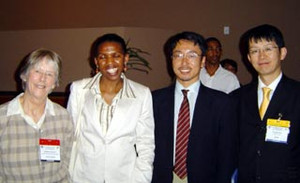
In her acceptance speech, Lorato Trok, speaking on behalf of all those involved with the project said that the IBBY-Asahi Award “is a victory for all South African children who have long waited to read and enjoy books that depict the surroundings they live in, and most importantly in their own languages. What better time could be to receive this award than now as we are celebrating ten years of democracy in our country! The problem of illiteracy in South Africa is one of the most vicious legacies of apartheid. In homes where the adults are illiterate or functionally illiterate, the children stand little or no chance of developing the literacy skills they will need to be able to make sense of their school environment when they begin formal schooling. There is a perception that African people have a culture of non-reading. I dispute this. I grew up in poverty and neither my mother nor my father was a reader. What I know is I have always loved books and reading. I would pick up anything with words on it to read. There weren’t any books in my native Setswana language that I could read except textbooks. The only thing that kept me from owning books was that my parents couldn’t afford to buy us books, and there was no library in our area nor in any of the schools I attended. What we rather say is African people love books and reading just as much as anyone, but because the majority of them are poor, buying books is not a priority in terms of need. We often equate books with intelligence and wealth, and this excludes the rural poor, and also makes them feel threatened. With the First Words in Print project we are unearthing the love of reading from children whose parents cannot afford to buy books for them, and in the same way inculcating a culture of reading in that delicate early age, as well as appreciating their languages. We are also saying reading books should be fun. We still have a long way to go, but we are making a huge progress.”
IBBY Honour List 2004
Nineteen nominees on the IBBY Honour List 2004 went to Cape Town to receive their diplomas for excellence in translating, writing and illustrating. Former IBBY Executive Director, Leena Maissen gave a slide show presenting the titles nominated for writing and illustration. This year, a record 140 titles were nominated and, therefore after giving the overview, she invited the participants to view the entire collection, which was on display during the Congress. Peter Schneck, Kimete Basha and Liz Page presented the nominees with their diplomas. This year, for the first time, diplomas were also produced for the publishers of the nominated titles with the aim of encouraging them to support their National Sections. The Japanese translator, Kyoko Matsuoka thanked IBBY on behalf of the nominees and emphasized the importance of its mission to promote publishing of quality children’s literature as a vehicle for international understanding.
IBBY Honour List 2004 (PDF 1.0 MB)
Future of IBBY Sessions
Peter Schneck and Kimete Basha organized a discussion chaired by Professor Sandile Gxilishe of Cape Town University called The Future of IBBY. After which there was a series of breakout sessions that aimed to continue the work begun in September 2003 with the comprehensive survey of all National Sections. The main objective of the survey was to identify the concerns of the membership and to generate responses to these. The intention was to involve the National Sections in the process of change and development, and to invite them to suggest areas for improvement. The aim of the Future of IBBY sessions was to discuss and build on the survey findings and to generate recommendations for the Executive Committee that would influence future policy in seven key areas:
1. Funding
2. The Structure of IBBY or IBBY governance
3. Internal Communications and Cooperation
4. External Communications and Cooperation
5. IBBY Goals and Objectives and Developing Nations
6. IBBY Activities
7. The Purpose and Responsibilities of National Sections.
Seven working groups were established; each was led by a member of the Future of IBBY Subcommittee, which included Kimete Basha, Liz Page, Anne Pellowski, Vagn Plenge, Peter Schneck, Elizabeth Serra and Nilima Sinha. About 100 participants from over twenty countries attended the sessions.
Recommendations included: that IBBY employ a fundraiser who knows IBBY well to define and implement a co-ordinated fund-raising strategy; that more modestly organized regional congresses be encouraged; that IBBY develop an interactive website that would encourage an increased synergy between the National Sections and the Secretariat; that IBBY should develop stronger partnerships with other international organizations with shared goals; that IBBY introduce an associate membership category that would allow groups in countries with no national section to be part of the IBBY network; that IBBY encourage more extensive twinning initiatives modelled on the successful experiences that already exist and finally; that IBBY expand its international presence through an increased range of international activities, especially those involving developing countries.
Closing Ceremony
The 29th IBBY Congress came to a happy close at the Somerset House School. Music and children again held the attention of the participants. Peter Schneck introduced the new Executive Committee and thanked the outgoing members. He also thanked the outgoing Bookbird editorial team for their hard work over the past few years, and welcomed the new team of Valerie Coghlan and Siobhán Parkinson.
With the help of former IBBY Presidents Ron Jobe, Carmen Diana Dearden and Tayo Shima, Peter Schneck conferred Honorary Membership on former Executive Director Leena Maissen for her extraordinary contribution to IBBY.
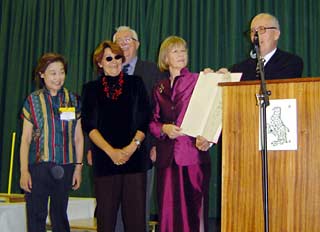
Kimete Basha thanked the organizers on behalf of IBBY and during her address officially stepped down from her role as Executive Director. In her closing address, she urged that, “when we pack tomorrow or the next day, let’s be sure to take with us some of the energy and enthusiasm that we have encountered at this congress. We shall all need it when we return to the constraints that we all confront every day as we try to make our IBBY dreams come true. Like Jella Lepman, we live in a troubled world and every day our work to put good books into the hands of children is a struggle. If, when we return to our various battlegrounds, we remember these now familiar faces and their stories, we will remember that we are part of a community of many engaged in the fight for the sake of the book and the child, and that IBBY’s mission to build a more peaceful world may be difficult but it is shared by many good men and women in whose determination we can find sustenance when we most need it.” She thanked the organizers in Afrikaans, “Baie Dankie, South Africa. Baie Dankie, to the dozens of volunteers who attended to all our needs with untiring courtesy and warmth, and who made us feel at home. Baie Dankie to Jay Heale and his extraordinary team who were somehow able to plan a congress that addressed specifically the many challenges of children’s book publishing in Africa even while it went far beyond this to speak about all books and all children everywhere.” In closing, she added that, “it has been a privilege to serve IBBY for even a very short while. When I came, I think that above all I secretly wanted to touch all your lives, transform IBBY and make things somehow ‘better’ for the children who are at the heart of everything I have ever done with my life. Now, that I am going, I realize that, in fact, it is all of you who have touched mine and made it very different from what it was a year ago”.
Congress organizer Jay Heale thanked all the participants on behalf of the South African Children’s Book Forum for making the journey to Cape Town to attend the Congress. Kent L. Brown of USBBY, returned the compliment on behalf of the Congress participants, thanking the organizers for their enormous efforts.
After the invitation by Hai Fei, President of CBBY, to attend the 2006 Congress, an exciting film promoting the Congress in Beijing was shown, promising another great IBBY Congress. Jay Heale then officially handed over the ‘baton’ of Congress Organizer to Hai Fei and his team. This year the baton was an African drum!
The evening, and the Congress, ended with the Farewell Dinner at Somerset College, where all friends – old and newly made – could talk and exchange addresses during the final sumptuous feast of Congress 2004!


